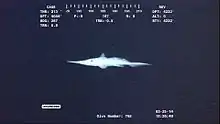Rhinochimaeridae
The Rhinochimaeridae, commonly known as long-nosed chimaeras,[2] are a family of cartilaginous fish. They are similar in form and habits to other chimaeras, but have an exceptionally long conical or paddle-shaped snout. The snout has numerous sensory nerve endings, and is used to find food such as small fish.[3] The first dorsal fin includes a mildly venomous spine, used in defense.[1]
| Rhinochimaeridae | |
|---|---|
.gif) | |
| Narrownose chimaera (Harriotta raleighana) | |
| Scientific classification | |
| Kingdom: | Animalia |
| Phylum: | Chordata |
| Class: | Chondrichthyes |
| Order: | Chimaeriformes |
| Family: | Rhinochimaeridae Garman, 1901 |
| Genera | |
Long-nosed chimaeras are found in temperate and tropical seas worldwide, from 200 to 2,000 m (660 to 6,560 ft) in depth.[1] In August 2020, a long-nosed chimaera was brought up from 460 fathoms (2,760 ft; 840 m) off the Grand Banks of Newfoundland.[4]
They range from 60 to 140 cm (2.0 to 4.6 ft) in maximum total length, depending on species.

Species
The eight known species are in three genera:[1]
Family Rhinochimaeridae
- Genus Harriotta Goode & Bean, 1895
- Harriotta haeckeli Karrer, 1972 (smallspine spookfish)
- Harriotta raleighana Goode & Bean, 1895 (narrownose chimaera)

- Genus Neoharriotta Bigelow & Schroeder, 1950
- Neoharriotta carri Bullis & J. S. Carpenter, 1966 (dwarf sicklefin chimaera)
- Neoharriotta pinnata Schnakenbeck, 1931 (sicklefin chimaera)
- Neoharriotta pumila Didier & Stehmann, 1996 (Arabian sicklefin chimaera)
- Genus Rhinochimaera Garman, 1901
- Rhinochimaera africana Compagno, Stehmann & Ebert, 1990 (paddlenose chimaera)
- Rhinochimaera atlantica Holt & Byrne, 1909 (broadnose chimaera)
- Rhinochimaera pacifica Mitsukuri, 1895 (Pacific spookfish)
References
- Froese, Rainer, and Daniel Pauly, eds. (2009). "Rhinochimaeridae" in FishBase. January 2009 version.
- McMillan, Elizabeth (2016-03-07). "Creepy deepwater fish surprises Nova Scotia fisherman". CBC News. Retrieved 2020-08-22.
- Stevens, H. & Last, P.R. (1998). Paxton, J.R. & Eschmeyer, W.N. (eds.). Encyclopedia of Fishes. San Diego: Academic Press. p. 69. ISBN 0-12-547665-5.
- White, Jen (2020-08-22). "What in the heck was that?': Fisherman shocked to haul in long-nosed chimaera". CBC News. Retrieved 2020-08-22.
External links
| Wikispecies has information related to Rhinochimaeridae. |
- Froese, Rainer, and Daniel Pauly, eds. (2011). "Rhinochimaeridae" in FishBase. 2 2011 version.
